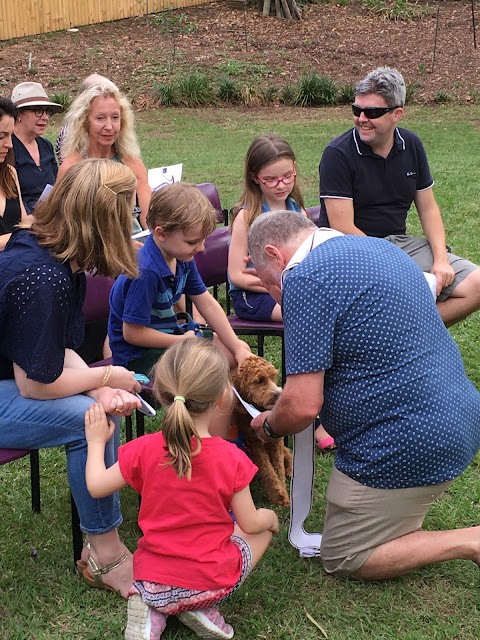2018: The Year of Being "Generations Together"
As each new year begins, I usually receive a series of phone calls in my
office, each of which goes something like this:
Caller: Hi Jonathan, it’s Father Fred from St Swithin’s here. We’ve
just had a parish visioning day and we’ve identified youth and children’s
ministry as one of our top three strategic priorities. We’ve looked around and
realised we need to start a youth group and a kids club ASAP, so how do we do
that?
Me: This is all good to hear but let me ask you this: how often in your
church do you have different generations doing something together at the same
time?
Caller: Basically never, because people wouldn’t enjoy it. Each
generation wants to do what it likes doing. Kids want to run around, oldies
want to sit and chat. You know how it is – they all have their own needs!
Me: Do you remember doing good things at church a long time ago where
all the generations were together?
Caller: Sure, we used to do all kinds of things – all-age Mothering
Sunday services, picnics, cooking and delivering meals, family camps… Now that you mention it, I wonder why we
stopped doing all that?
And so the conversation continues. We all know there is nothing new
under the Sun, but what is remarkable is that many of us seem to have forgotten
the benefits of doing church in an intergenerational way. By
“intergenerational”, I mean intentionally (deliberately) bringing two or more
generations together to do things like foster relationships; share faith stories; incorporate
all generations in worship; develop service projects that involve all ages; and
engage all generations in learning together. It means more than just placing
the generations side by side: it’s about designing ways for different
generations to be listening to each other and learning from each other.
Scripture
and tradition tell us that this approach has been a feature of Judeo-Christian
religious life for a very long time, and yet, it has somehow disappeared in
recent decades as ‘generational ministry’ became a professional specialty –
younger generations left the church (literally) to engage in activities by
themselves, and I think this happened so frequently that eventually young
people came to believe that they didn’t belong with the rest of the church. Is
it a coincidence that recent decades have also seen a profound decline in the
number of young people attending church beyond childhood?
The
Bible does not make any reference to age segregation in the life and worship of
Christian communities, leading a colleague of mine from another denomination to
tell me he thinks such segregation within our churches is a form of sin! Instead, Holly Allen and Christine Ross in
their magnificent Intergenerational Christian Formation: Bringing the Whole
Church Together in Ministry, Community and Worship (IVP, 2012) list
fourteen pages of biblical passages reflecting an intergenerational outlook:
from Deuteronomy 31 (“Assemble the people, men, women and little ones…that they
may hear and learn to fear the LORD your God”) to Psalm 145 (“one generation
commends your works to another; they tell of your mighty acts”) to Acts 21 (“we
departed and went on our journey, and they all, with wives and children,
accompanied us until we were outside the city”). Allen and Ross make a compelling case for the
need to rediscover the intergenerational approach of the early and not-so-early
churches.
I
should point out that no one (or not many) is seeking a complete stop to Sunday
Schools and youth services, because there is some truth in the need at times for
age-appropriate activities and bonding with people your own age. But the
influence of academics in the 70s and 80s who wanted to shape church life to
reflect the cognitive needs of different age groups went too far, because
someone’s stage of faith development or “spiritual age” does not necessarily
match their chronological age. So, I argue that the major point of focus in
your church programming should be on bringing the generations together whenever
possible.
There
are many ways of adopting an intergenerational approach in a church, school or
workplace, and over the course of this year of exploring what it means to be “Generations
Together”, we’ll be hearing much more about successful intergenerational
programs and approaches from not only our Diocese, but from around the world.
John
Roberto is an American writer and presenter who is acknowledged as one of the
world’s leading exponents of intergenerational ministry, and his websites (e.g.
www.lifelongfaith.com) are full of free, curated resources and practical ideas as to how
to achieve excellent all-age ministry in virtually any conceivable context.
What’s especially exciting is that John Roberto will be joining us as the guest
speaker at the Provincial Clergy Conference and Lay Conference in early August.
I believe John’s presentations will be truly transformative moments in the life
of our diocese, as he outlines his findings from a lifetime of study of models
of faith formation, and suggests exactly how they could be implemented in your
context.
Some ACSQ
churches have already discovered the benefits of adopting an intergenerational
mindset, and I look forward to sharing their stories throughout the year. For
example, catering to “All Ages” is one of the core values of “Messy Church”
which is working successfully in many parishes, while others are enjoying the creation
of all-age or “all-in” worship services. The Roscoe Library at St Francis
College Milton has many books on the subject, as well as numerous other resources
to help you make your church more intergenerational in its flavour, and of
course our AYCF team is always happy to advise each parish specifically.
I am
already looking forward with excitement to where the year of being “Generations
Together” will take us, individually and collectively. If the impact of
intentional focus on this area is as great as I predict it will be, then I
anticipate 2019 will be the year when the first phone calls I receive are less
about asking me for ideas on how to work with segregated groups of youth and
children, and more about sharing experiences of how an intergenerational
approach has brought growth in faith, service, generosity and numbers.



Comments
Post a Comment